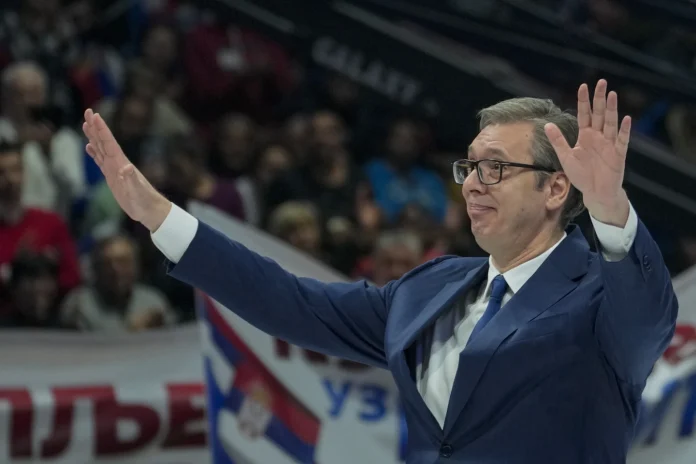Serbian President Aleksandar Vučić claimed victory in early parliamentary elections on December 17, following projections that his ruling Serbian Progressive Party (SNS) was on track for an easy win.
This is an absolute victory and it makes me happy.
Pollsters Ipsos and CeSID predicted the SNS would garner 46.2 per cent of the vote, while the opposition Serbia Against Violence (SPN) alliance would come second with 23.2 per cent, according to votes counted at a sample of polling stations. The Socialist Party of Serbia of outgoing Foreign Minister Ivica Dačić came third with 6.7 per cent of the vote.
The parliamentary elections coincide with local elections in most municipalities, the capital Belgrade and the northern province of Vojvodina.
According to pollsters, SNS won the most votes in Belgrade with 38.6 per cent of the ballots for city council and mayor, while the oppositional SPN came second with 35 per cent of the vote.
Belgrade, with a population of 1.4 million, represents about a quarter of Serbia’s electorate, with its mayor considered one of the most powerful officials in Serbia.
However, CeSID and IPSOS reported a series of violations, including the orderly arrival of voters at polling stations, the photographing of ballots and procedural errors. Moreover, Serbia Against Violence accused the ruling party of electoral fraud and, on behalf of one of its leaders Miroslav Aleksić, stated that it would file a complaint with the State Election Commission.
We have witnessed a serious attempt to steal elections.
18 parties and alliances competed for 250 seats in parliament, with the threshold for getting into parliament set at 3 per cent of the vote.
A preliminary vote count revealed that the SNS would have a slim majority of at least 127 MPs. The party is expected to seek coalition partners to solidify its dominance in parliament.
Opposition parties and human rights activists accuse Vučić and SNS of vote-buying, stifling media freedom, violence against opponents, corruption and connections to organised crime. Vučić and his allies deny the allegations.
The State Election Commission reported that election observers from the CRTA observation organisation were attacked in northern Serbia. Later, police reported the arrest of a person linked to the incident.
Parliament is required by law to convene within two weeks of the official announcement of the final election results, after which parties have 60 days to form a government.
Serbia, a candidate for European Union membership, must first normalise relations with Kosovo, a former predominantly Albanian province that declared independence in 2008. However, EU-mediated talks between Belgrade and Pristina have stalled, with tensions remaining high.
Serbia also needs to eliminate corruption and organised crime, liberalise its economy and align its foreign policy with that of the EU, including the imposition of sanctions against Russia amid the war in Ukraine.
